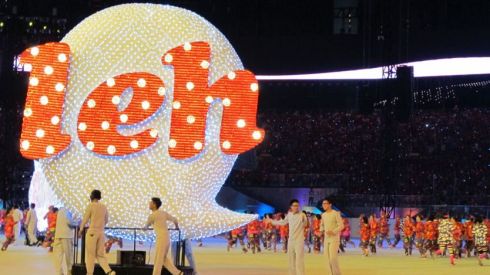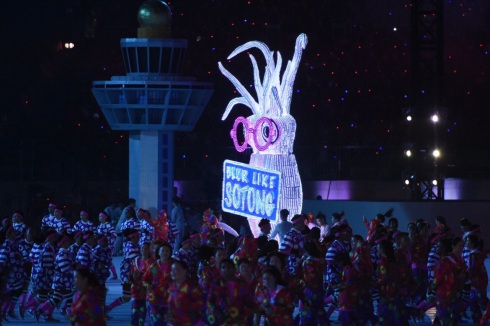Singapore has become a multicultural country that embodies the ideology of culture and language, with society continuing the ongoing everyday practice of using Singlish. With nearly 5.3 million people in Singapore, the ethnic groups are mixed with 76.8% Chinese, 13.9% are Malay, 7.9% are Indian and 1.4% belong to other cultures such as Europeans, Eurasians and Arabs. Officially there are four languages that are recognized in Singapore including English, Mandarin, Malay and Tamil. Ever since the British colonialism, English became the leading language in the education system, since it is a desirable asset especially showing its high etiquette and professional skills in any industry. However, Singaporeans are well-known for speaking Singlish, which is described as a hybrid of English, Malay and Mandarin and a variation of Chinese dialects. This has been issued largely across the nation especially with the government because it has caused difficult situations for standard English speakers to understand especially with the differentiation of grammar. With this cultural practice, Singapore has been divided upon with some issuing Singlish as a problem of laziness and unable to speak proper English, allowing themselves to limit their communication skills. Although there are some Singaporeans, whom have using it all their lives as it is “considered to be within their blood and it is a way of life” (The Thinker 2013). Therefore it enhances their culture by embracing this as their national identity, making them feel like their home.

In 1965, only a small portion of Singaporeans were able to speak English properly that were mastered within the elite, mainly for official purposes such as in government offices and even law courts. The Federation of Malaysia began an active campaign to promote the use of English as “it was a seen as key to the nation’s economics survival.” (Yeo 2010). Due to the significant change within globalisation, Singapore was seen as a target market to explore business, therefore proficiency English was to attract foreign investments. As David Young Soon Chye suggests “English remains an important language because Singapore seeks to attract and sustain transnational investment and new entrepreneurial initiative in order to gain a competitive edge over its regional neighbours.” (Young Soon Chye 2010). Since Singapore does not possess any natural resources, their access to scientific and technological knowledge was the main purpose to bring business and to connect with international businesses and markets.
Politically, English become the ultimate foundation of bringing Singapore forward as they view Singlish to be harmful and a threat towards society, especially with the development of the economic and its nation. As well as a dysfunctional and corrupted language that does not need to continue for the future Singaporeans, since they want to avoid failing to speak a language in an improper manner. Therefore in 1999, Prime Minister Goh Chok Tong addressed his speech in the National Day Rally emphasizing the importance of using standard English to be able to remain competitive and relevant within the global economy. He highly recommended that Singaporeans should be able to speak a form of English that is understood by the British, American, Australian and international community. Then Senior Minister Lee Juan Yew voiced his concern with the increasing use of Singlish, by encouraging the nation to be able to write and speak English as he mentions “we can understand the world and the role can understand us. Singlish is a handicap we must not wish on Singaporeans.” (Yeo 2010).
However there are strong supporters of using Singlish within their daily life as they have defended this against the local linguistic landscape and the government. Singaporeans believe that by including Singlish in their vocabulary, it allows them to become more diverse with each other and truly shows its cultural values and heritage. Its said that it is their form of communicating with others in a unique way, which displays a part of who they are. Since their main argument is that Singlish “cuts across racial difference and thus functions as a marker of a distinct, multi-ethnic Singaporean identity.” (Yeo 2010). In other words, it fundamentally works among the nation to be able to speak Singlish, since it is their way and practice that is accustomed everyday.

Referencing:
K. B. Tan, E. 2016, Singlish -a unique Singaporean Threat, Today, Singapore, viewed 22nd January 2017, <http://www.todayonline.com/commentary/singlish-uniquely-singaporean-threat>.
Lu-Lien Tan, C. 2016, The Singlish Language Reflects the Power of My People, Time Magazine, United States, viewed 21st January 2017,<http://time.com/4441078/singlish-language/>.
The Thinker 2013, Singlish: Culture or Bad Habits, The Smart Local, Singapore, viewed 22nd January 2017, <http://thesmartlocal.com/read/singlish-culture-or-bad-habit>.
Wong, T. 2015, The Rise of Singlish, BBC News, Singapore, viewed 22nd January 2017, <http://www.bbc.com/news/magazine-33809914>.
Yeo, T. 2010, Singlish, National Library Board, Singapore, viewed 23rd January 2017, < http://eresources.nlb.gov.sg/infopedia/articles/SIP_1745_2010-12-29.html>.
Young Soon Chye, D. 2009, Standard English and Singlish: The Clash of Language Values in Contemporary Singapore, PhD thesis, La Trobe University and University of Malaya, Sydney and Malaysia.
Multi-Media Referencing:
Channel News Asia 2015, Live Blog: SG50 National Day Parade, viewed 25th January 2017, <http://www.channelnewsasia.com/news/singapore/live-blog-sg50-national/2038968.html>.
Wong, T. 2015, The Rise of Singlish, BBC News, viewed 22nd January 2017, <http://www.bbc.com/news/magazine-33809914>.
World News 2015, Singapore at 50: Learning to Speak ‘Singlish, video recording, YouTube, viewed 25th January 2017, <https://www.youtube.com/watch?v=TlPMB0GZDfY>.
